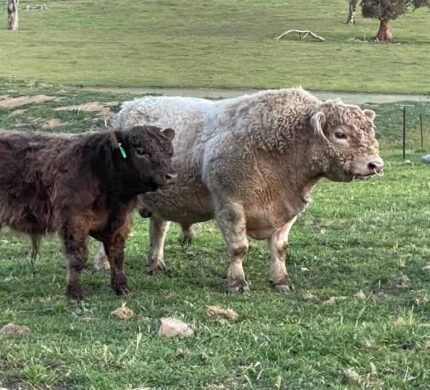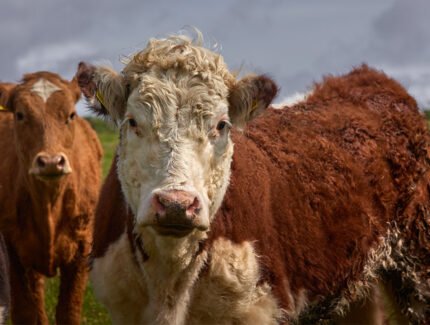Galloway Cattle
- Temperature:38.6°C to 39.7°C (101.5°C to 103.5°F)
- Milk:Not raised for milk production
- Food:Grass-fed and forage sources
- Pregnancy:Approximately 9 months
- Nationality:Scottish

General Information
Galloway cattle are a breed of beef cattle that are known for their hardiness and adaptability to harsh environments. They originated in the Galloway region of southwestern Scotland and have been bred for their ability to thrive in rugged and mountainous terrain.
One of the defining characteristics of Galloway cattle is their distinctive coat. Their hair is long, shaggy, and curly, which helps to insulate them from cold and wet weather. They come in a range of colors, including black, white, and red, and may have a white stripe down their back.
Galloway cattle are known for their docile temperament and are often used in conservation grazing projects. They can maintain biodiversity in areas where traditional farming is not feasible.
In addition to their usefulness as grazers, Galloway cattle are also valued for their high-quality beef. The meat is well-marbled and flavorful, and is often sold at a premium to discerning consumers.
Overall, Galloway cattle are a hardy and versatile breed that has found a place in a variety of roles, from conservation grazing to high-end beef production. Their distinctive appearance and gentle disposition make them a favorite among farmers and animal lovers alike.
Where we find this cow to buy?
If you are interested in purchasing Galloway cattle, there are several options available to you. Here are a few places where you might be able to find Galloway cattle for sale:
01. Contact a breeder: Breeder associations, such as the American Galloway Breeders Association, maintain a breeder directory on their website. They can refer you to galloway cattle breeders.02. Livestock Auctions: You may be able to find Galloway cattle for sale at livestock auctions in your area. Many cattle auctions offer a variety of breeds, including Galloways.03. Online Marketplaces: Online marketplaces specialize in buying and selling cattle. Cattle Range, Ranch World Ads, and Livestock Of America often sell Galloway cattle.04. Classified ads: Check local newspapers or online classified ads for Galloway cattle for sale.
You should do your research when buying Galloway cattle or any livestock. Before purchasing an animal, ask about its health history, genetics, and inspect it thoroughly.

How to increase milk production in Galloway Cattle?
Galloway cattle are primarily raised for meat production, and their milk production is relatively low compared to dairy breeds. However, there are a few things you can do to help maximize milk production in your Galloway cattle:
Providing your Galloway cattle with a balanced and nutritious diet is crucial for milk production. Forage and feed should be of high quality.
It is imperative that milk be produced in plenty of water, so make sure that cows always have access to clean, fresh water at all times in order to produce milk.
Genetically sound bulls can help you increase milk production over time. Breed your cows with high milk-producing bulls using artificial insemination.
Comfortable cows are happier and healthier, which can lead to better milk production. Make sure your cows have a clean, dry, and comfortable environment.
It is important to note that Galloway cattle are not typically used for dairy production, so while these tips can help maximize milk production, they will not result in the same level of production as you would see in a dairy breed.
Medicine
There are several medications that may be used for Galloway cattle, depending on the health issue being treated. Here are a few examples of medications that may be used:
01
AntibioticsIn Galloway cattle, antibiotics are used for respiratory infections, mastitis, or foot rot. How to use antibiotics depends on infection type, age, and weight.
02
Anti-inflammatory DrugsThese drugs are used to reduce inflammation and pain in Galloway cattle, and may be used to treat conditions such as arthritis or lameness.
03
DewormersDewormers can be used to control internal parasites in Galloway cattle. Treating lice or fungal infections with topical medications can be effective.
04
VaccinesVaccines are used to protect Galloway cattle from a variety of diseases, including respiratory diseases, viral infections, and clostridial diseases.

- Galloway cattle are primarily grass-fed animals and are well-suited to grazing on rough, upland pastures. They are able to extract nutrients from tough, fibrous grasses that other breeds may find difficult to digest, and their hardiness means they can thrive in areas with limited feed resources.
- In addition to grass, Galloway cattle may also consume other forage sources, such as hay or silage, particularly in the winter months when grass is less abundant. They have a low to moderate feed requirement, and their efficient use of feed resources makes them a good choice for sustainable and low-input farming systems.
Important!
It’s important to note that while Galloway cattle are well-adapted to grazing and foraging, their nutritional requirements still need to be met in order to maintain good health and productivity. In some cases, supplementation with minerals or other nutrients may be necessary to ensure that their dietary needs are being met.
Overall, Galloway cattle are hardy, adaptable animals that can thrive on a variety of forage sources, making them a good choice for low-input or sustainable farming systems.
Pregnancy
Pregnant Galloway cattle require a balanced and nutritious diet that provides the necessary nutrients for fetal growth and development. Ensure that they have access to high-quality forage and a well-formulated feed, and consider supplementing with minerals and vitamins as needed.
As the due date approaches, it is important to prepare for calving by providing a clean, dry, and comfortable environment for the cow. Consider creating a calving pen and ensuring that you have the necessary supplies on hand, such as clean towels, obstetric chains, and disinfectant.
Regular check-ups with a veterinarian are important during pregnancy to monitor the health of the cow and the developing calf. Your veterinarian can also provide guidance on any necessary vaccinations or treatments.
Monitor your pregnant Galloway cattle closely for signs of illness or distress, and seek veterinary care if needed. Additionally, keep an eye on the cow’s body condition, as underweight or overweight cows may have difficulty calving or producing enough milk.
Facts
Galloway cattle have a distinctive appearance, with a thick, curly black coat that provides insulation and protection from the elements. They have a broad forehead, short and sturdy legs, and a deep, wide chest.
Galloway cattle are well-suited to living in harsh and rugged environments, thanks to their hardiness and adaptability. Cold and wet climates are no problem for them.
Galloway cows are known for their ease of calving, thanks to their wide pelvis and relatively small calves. Various breeds of dogs can crossbreed with them, which is a great advantage for crossbreeding.
Galloway cattle are known for their calm and docile temperament, making them easy to handle and work with.
Galloway beef is known for its high quality, with a distinctive flavor and tenderness that is highly prized by many consumers.
Their hardiness and adaptability make them well-suited to grazing in marginal areas and uplands. They also value genetic diversity.